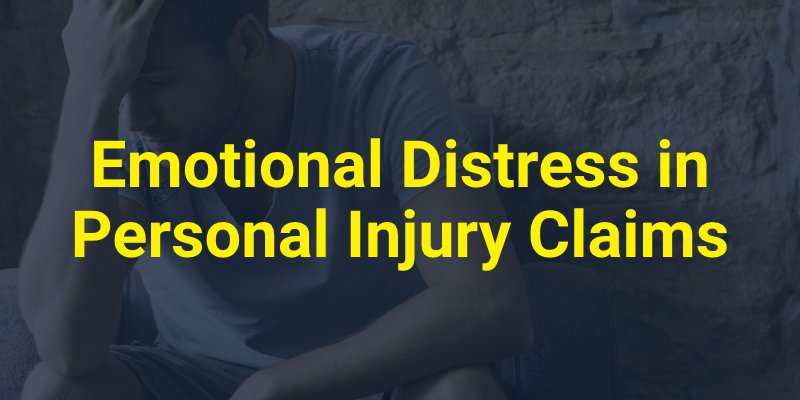Emotional distress is a significant component in personal injury claims. Unlike physical injuries, emotional distress can be more challenging to quantify, yet its effects can be just as debilitating, hindering daily activities and overall quality of life. Understanding this concept is crucial for victims seeking compensation, as it enables them to recover the compensation that they truly deserve.

What is Emotional Distress?
Emotional distress refers to the psychological suffering and negative emotional impact resulting from an injury or traumatic event. It encompasses a range of mental health issues. Unlike physical injuries, which can often be easily documented and measured, emotional distress is inherently subjective and can vary greatly between individuals. This makes it a complex aspect of personal injury claims but still an essential element deserving consideration and compensation.
Examples of emotional distress include:
- Anxiety and Fear: Victims may experience heightened anxiety or fear following an accident, leading to panic attacks or avoidance of places associated with the trauma.
- Depression: Persistent feelings of sadness and hopelessness can arise, affecting one’s ability to engage in daily activities and maintain relationships.
- Post-Traumatic Stress Disorder (PTSD): Individuals may develop PTSD after a traumatic incident, exhibiting symptoms such as flashbacks, nightmares, and severe emotional distress.
- Loss of Enjoyment of Life: Emotional distress can manifest in a decreased ability to find joy in activities that were once pleasurable, impacting overall quality of life.
Where Emotional Distress Occurs
Emotional distress can arise in various contexts, sometimes giving rise to personal injury cases. Common examples include:
- Auto Accidents: The sudden and violent nature of a car accident can lead to significant emotional trauma for survivors.
- Workplace Injuries: Injuries sustained at work can result in long-term emotional effects, including fear of returning to the workplace.
- Medical Malpractice: Experiences of negligence by medical professionals can erode trust and lead to emotional distress for patients and their families.
- Assault or Abuse: Victims of physical assault or abuse often face severe emotional and psychological repercussions that require support and potential compensation.
Understanding emotional distress is essential for victims of personal injuries to ensure they get the compensation they’re truly entitled to.
Proving Emotional Distress Damages
Demonstrating emotional distress damages in personal injury cases requires a comprehensive approach that combines evidence, expert testimony, and a clear explanation of the emotional impact suffered by the victim. Some of the evidence used to prove these aspects of a personal injury claim include:
- Medical Records: Documentation from mental health professionals is crucial in substantiating claims of emotional distress. This may include diagnoses, treatment plans, and records of therapy sessions that outline the emotional repercussions stemming from the incident.
- Witness Testimonies: Statements from family, friends, or colleagues can provide insight into the changes in the victim’s behavior, mood, and overall quality of life. These testimonies serve to corroborate the emotional impact described by the claimant.
- Personal Journals or Logs: Detailed accounts maintained by the victim can be powerful evidence of their emotional struggles. Entries that capture feelings of sadness, anxiety, or other distress can help illustrate the ongoing impact of the incident on their life.
- Expert Testimony: Psychologists or psychiatrists may be called upon to provide professional evaluations and testimony regarding the victim’s mental state. Their expertise can validate the emotional distress claims and explain how the distress correlates with the traumatic event.
- Employment Records: Evidence showcasing absences from work or a decline in job performance can indicate how emotional distress has affected the victim’s ability to function professionally, further strengthening the case for damages.
By gathering and presenting this variety of evidence, victims can effectively establish the validity of their emotional distress claims and seek appropriate compensation. For help with any aspect of your personal injury claim, contact us today to schedule a free consultation.
